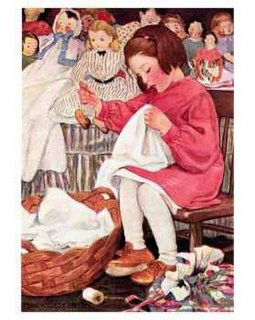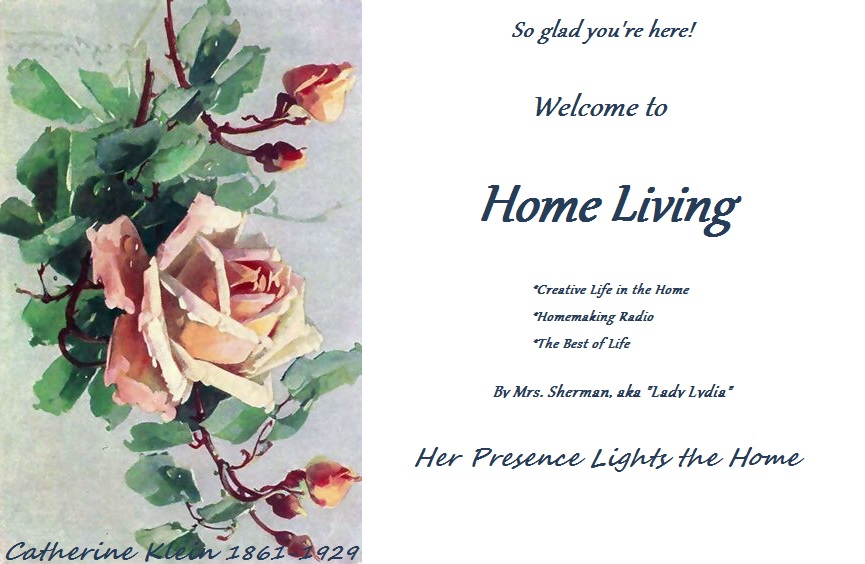
A host of people seemed unhealthily curious about what my daughter did at home, during her teen years. I'm not sure what they thought was happening, and although I assured them that she was content and busy, well-meaning relatives and friends thought that she would not be fully formed in some way if she did not go to public school, have boyfriends, or attend all the activities of other girls her age.
One of the by-products of daughters at home is their thoughtful approach to life. Everything has a purpose and there is no peer pressure to be distracted from the quiet pleasures which help develop their minds.
My daughter spent a lot of time looking at me. I remember thinking I had a little shadow, when she was young. While I was washing dishes, sewing, or cleaning house, I would sense those big brown eyes in that face framed by dark brown hair, staring at me. I would connect my eyes with her for a moment and then she and I would go about doing the things that we were doing. When she was very young, say, about 4, she seemed to look at me every 15 minutes. She came from her bedroom every quarter of an hour and found me, looked at me, and then went back to her occupation of playing or looking at books. As years went by, she looked at me less, until when she was in her teens, she would only come into contact with me every hour or two. Most of that period was spent worldlessly by my side in the kitchen or sewing, yardwork, shopping. Now that she is grown, she calls me at least once a day, but not always. She has discovered that one of her children has this same tendency.
I think this kind of contact is very important for the mother and child. It is a special bonding that is broken when the child is sent to other people to be educated. Instead of forming a bond with the parents and siblings, the child develops friendships that, although can be rewarding, do not have the same strength as family connections. By the time she was 15 she was capable of taking over the responsibility of the home if I was tired, had to be away or was not feeling well. She married at 18, and has been married for almost 8 years, with three children. We noticed a lot of girls her age who thought she was being deprived of fun and parties and the free, single life of dating, did not fare so well in their lives. At a young age, many of them could not form good relationships, and already are sufferring from divorce.
One of the problems with dating is that it sets up a pattern of divorce. If you date someone for awhile, it should be for the purpose of marrying, however, most people don't date for that purpose. They just want to have fun. Then when they see something they like better, or if they have a little quarrel, they throw off that partner and find another one. The bonds that were formed are then severed, and there are a lot of hurt feelings on the path to finding the perfect mate. Most of the girls who thought we were crazy by protecting our daughter from dating, had difficulty being committed enough to marry, or finding someone committed enough to marry them. This is due to the dating mentality. Our son once wrote a tract about dating called, "Kissing, Hugging, and Dumping," because this is often what happens. Later, when some of these people get married, they have the same habits, which ultimately bring on marriage break up. If someone who has dated quite a lot, or has gone steady with someone, eventually marries, he faces the problem of the embarrassing contact with women he has dated before. Can you imagine walking arm in arm down the street with your husband or wife, and having to acknowledge and introduce a former boyfriend or girlfriend? Wouldn't it be better not to have "a past?"
When a girl has a settled way of life with her family at home, she will repel the guys who don't want the domestic type, and she will attract only the one who desires to settle down to the serious matter of marriage, home, and family. This kind of man may often have a strong bonding with his own parents, and want to reproduce that in his future life with his wife.
Some of the things my teen daughter did at home were routine. By this time, she had observed how the home operated for many years, and the routine was automatic to her. She often prepared meals because to her it was grown up and fun. She cleaned up the kitchen afterwards. She knew how to mop a floor, and straighten up a sitting room. She knew if this major work was done, she had time for even more exciting things like sewing, quilting, rubber stamping, letter writing, or hospitality. One of the highlights of her teen years was a type of cooking club that she formed. Once a month, she invited some girls to the house to cook and serve a meal to their parents. Each girl brought a recipe they had not ever tried before, and created a salad, a main dish, or a dessert. This helped them all learn more about cooking. These girls today still mention how helpful that was to them.
There were things she enjoyed besides homemaking that she did at home: she liked music a lot and after taking quite a few years of lessons, she set up her own studio in the home and taught piano to children. Stamps were just becoming available, so she made a greeting card business portfolio and took orders for cards. She also learned to quilt from books, and sold several quilts that she made.
One other thing that a daughter at home enjoys is planting a vegetable garden in the spring. Our daughter had a gardening diary, or notebook that you can buy, which had places to write the date certain things were planted, and were they were planted. It had a place where she could plan the garden. From a small raised bed, she grew an abundant amount of vegetables for the family.
Our family went into the Tea Party business, where we met many interesting people. One person we met was influential in the local newspaper, and asked our daughter to write a column for it each week, which she did via email, for several years.
Not all of her time was spent being productive. She had plenty of time to rest, and one of her favorite things to do was go retire early so she could read a good book. Her brothers used to complain, "I wish she had not found a book to read, because now I know she won't be playing with us for a long time!" When she lost herself in a book, the boys begged her to play with her. Growing tired of interruptions, she closed the door of her room. They then slipped notes under the door. When that didn't work, they went outside and tapped on her window. Eventually she had to give up and come out, lest the pestering continue.
I've met other daughters at home and not one of them regret being under their parents roof during those years. They slipped easily from their parents home to their husband's home, to continue and improve that way of life which they had enjoyed. These girls adjusted well to marriage, home and family.





